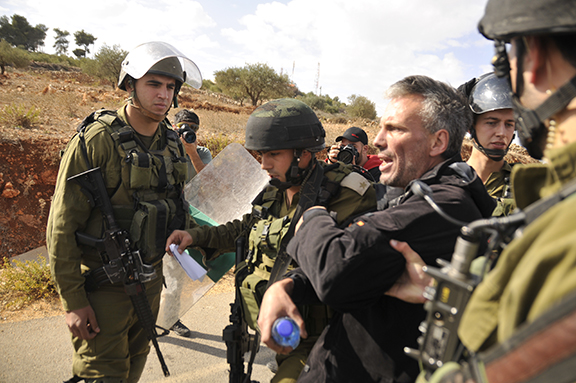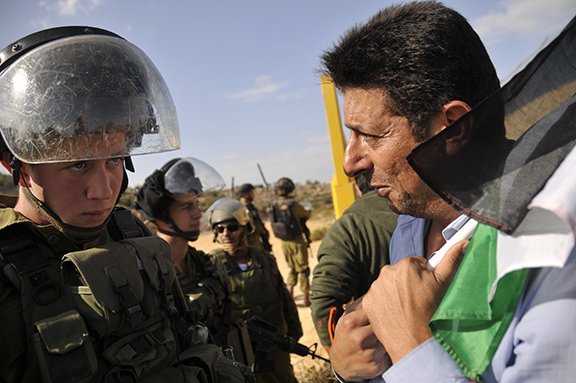On its second full day in the West Bank November 8, the Veterans Peace Team delegation took part in a creative demonstration near Bethlehem. All the participants walked away feeling empowered by the action, in which the veterans spoke extensively to young Israeli soldiers, encouraging them to look critically at their mission.
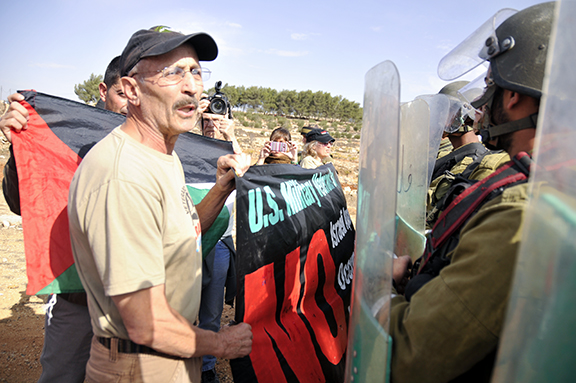
VFP Board Member speaks to Israeli soldiers as they push demonstrators back off the road. Photo by ELLEN DAVIDSON
By Ellen Davidson
The Veterans Peace Team delegation in Palestine came face to face with the Israeli Defense Forces in the West Bank village of Al Masra today.
The group of three men and three women is in Palestine to participate in the struggle against the U.S.-backed Israeli occupation. Five of the six are U.S. military veterans, and all are members of Veterans For Peace.
Al Masra, south of Bethlehem, is one of many villages that have developed Popular Committees to nonviolently resist construction of what Israelis call the “separation barrier” and Palestinians and their supporters refer to as the “apartheid wall.” In places, it consists of 26-foot-high concrete slabs and it snakes through the West Bank, sometimes following the “Green Line” that marked the border between Israel and the West Bank before the 1967 invasion and occupation, but more often cutting deep into Palestinian territory to take lands with valuable resources and to make room for existing and planned illegal Israeli settlements. Around Jerusalem and Bethlehem, in particular, the wall follows a complex path that cuts Bethlehem off from neighboring Jerusalem, isolates Palestinian villages on the “wrong” side of the wall, and serves to force Palestinians to move away from certain areas where further illegal settlement construction is planned.
All this was explained in a presentation by Mahmoud Zwahre, head of the Al Masra Popular Committee. Pointing to a map of the area on the wall, Zwahre showed how the wall, existing and planned settlements, and the system of Israeli-only roads were choking off the connections between Bethlehem and the surrounding Palestinian villages. He himself had not visited Jerusalem, less than five miles to the north, for 15 years. “It helps to keep people apart. Each side is wondering who is on the other side of the wall.”
Zwahre was briefing the VPT delegation and other internationals, including visitors from an unofficial sister city in France and football (soccer) fans from Hamburg and Frankfurt in Germany, in advance of the weekly demonstration against the wall that runs through Al Masra, cutting residents off from their land, where Israeli settlers have moved in.
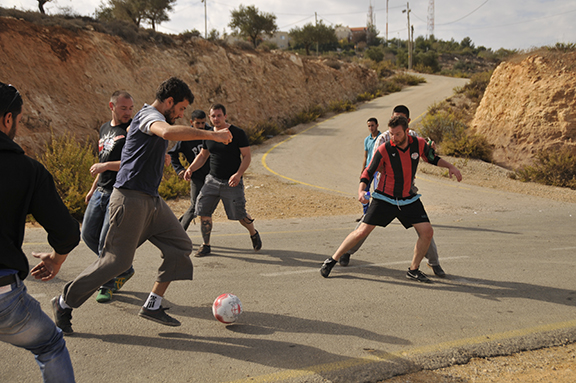
Palestinians and Germans play a fierce football match; behind them, the road leads up to an illegal Israeli settlement. Photo by ELLEN DAVIDSON
The action today was different from most Friday demonstrations in Al Masra, in which protesters march down to the wall from the entrance to the town. Instead, participants drove to a different location and walked a short distance to a gate that had a three-foot gap on one side for farmers to bring their herds of goats through. The Palestinians and their international supporters walked through the gap and commenced to take over the road, which is reserved for settlers, for a spirited game of football between village residents and the visitors from Germany.
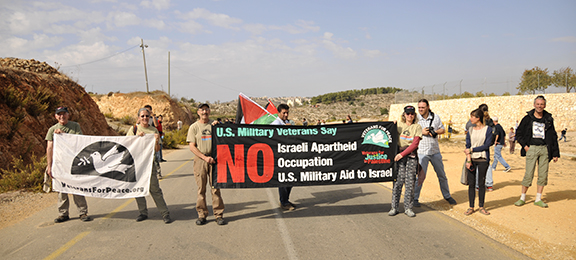
Veterans For Peace members take up a position in the road as the football match continues behind them.. Photo by ELLEN DAVIDSON
As the match proceeded, Israeli soldiers began gathering at the top of the hill up the road. As they got out of their trucks and jeeps and began to move toward the protest, one of the village leaders asked the VPT delegation to deploy with their banners in front of the ongoing football game. He kept up a monologue, telling the soldiers that they were on Palestinian land, that we were nonviolent, and that they were invited to join the football game. The IDF troops approached and lined up with plastic shields directly in front of the veterans, who began explaining that they were U.S. military veterans who had come to protest the Israeli occupation.
At one point, a few soldiers went behind the banners, picked out the leader of the French sister city delegation, and took him into custody for no apparent reason.
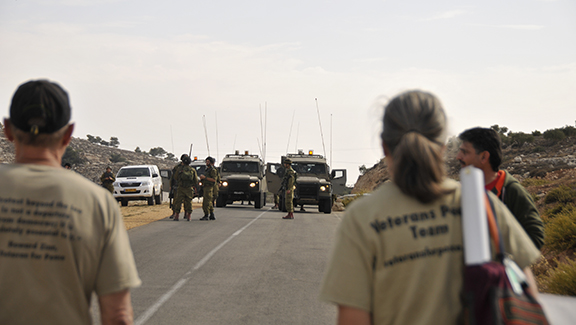
Tarak Kauff and Lorna Vander Zanden stand with Veterans For Peace banners while Israeli soldiers come down the road. Photo by ELLEN DAVIDSON
Eventually everyone was pushed off to the side of the road, where the veterans stood opposite the soldiers and spoke of their experiences in war: “I know of several U.S. soldiers were involved in atrocities during the U.S. war in Vietnam,” said Mike Hastie, who served as a medic in that war. Army vet Ellen Barfield told them, “You don’t have to do this. You can leave the military. We were soldiers too, but we came to recognize that was wrong. We know many Israeli soldiers who have left the military to work for peace. ”
Tarak Kauff, former U.S. paratrooper, said, “You are supporting something that the whole international community knows is wrong. The occupation is wrong, and Israel is practicing apartheid. We don’t want U.S. dollars supporting this.” He urged the soldiers to think about what they were doing: “We know you’re following orders, but orders can be wrong. We realized that when our country was in Vietnam. We understand what it means to be a soldier, but it’s more important to be a human being.”
“I was a Marine Corps officer, and I followed every order I was given for eight years and figured out I was wrong to do so,” said Ken Mayers.
Lorna Vander Zanden, U.S. Army biologist for 20 years, encouraged the soldiers to get a good education: “I worked on a vaccine for malaria. The military can do more useful things than enforce an occupation. And I resent that so many of my tax dollars are going to support the Israeli military’s oppression of the Palestinian people.”
Al Masra Popular Committee leader Zwahre asked the Israeli troops why they were keeping him from going onto Palestinian land while they allowed Israeli settlers to use the road. “Look straight into my eyes. I am standing here in front of you talking to you. Make a connection with me.”

